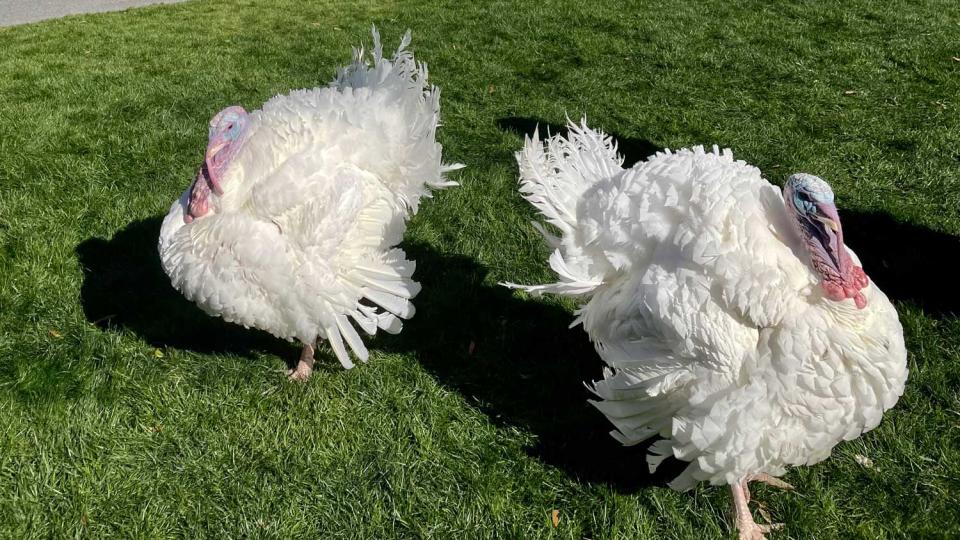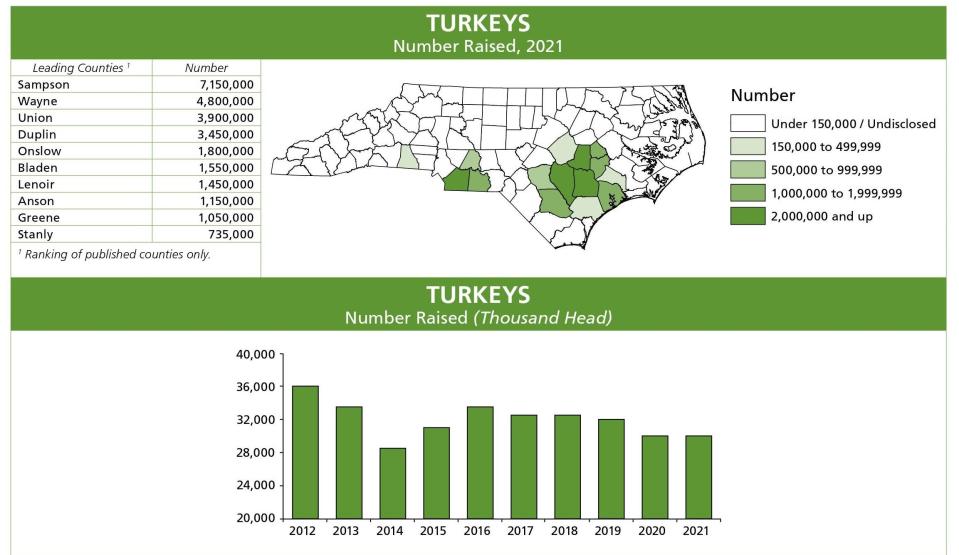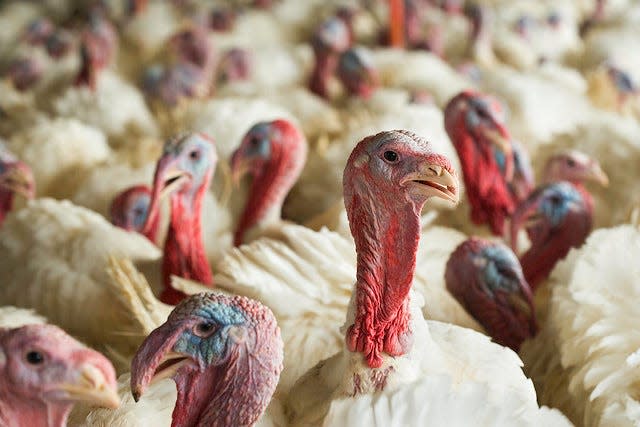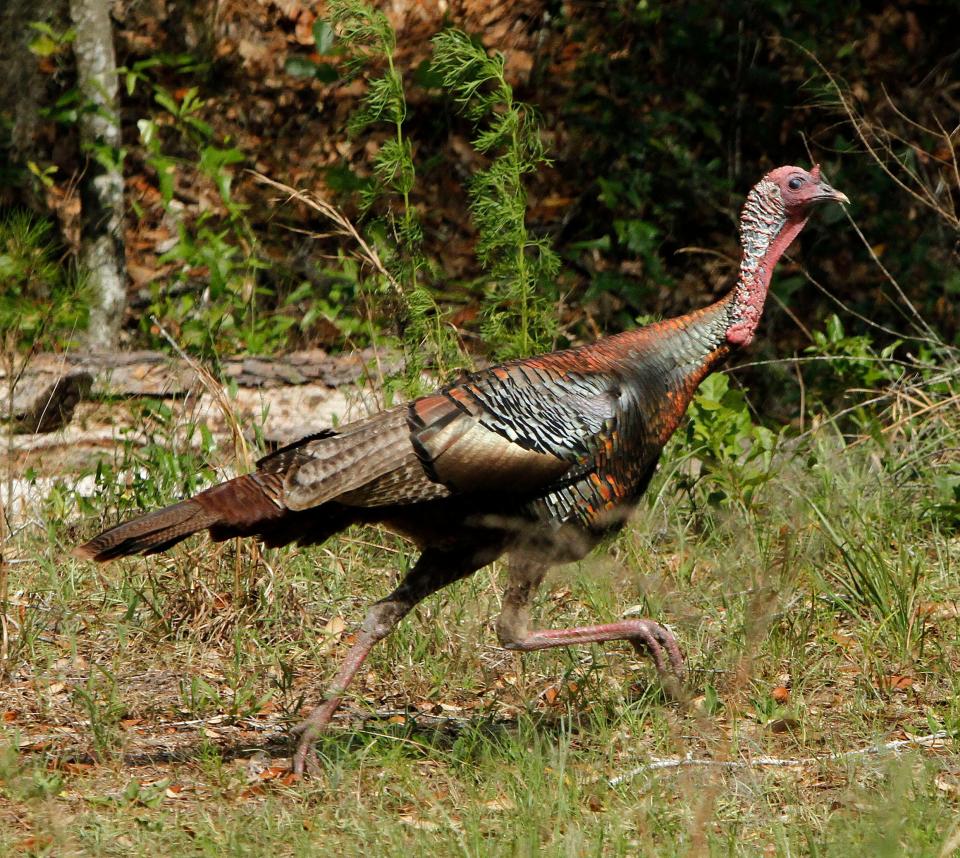Talking turkey is big business in North Carolina. Here's why.
When you hear the words chocolate and chip, turkey might not be the first food that comes to mind.
But last November, two turkeys dubbed Chocolate and Chip from Monroe, N.C., received the presidential seal of approval to live past Thanksgiving.
“The votes are in, they’ve been counted and verified, no ballot stuffing, no fowl play. The only red wave this season is going to be if German Shepherd Commander knocks over the cranberry sauce,” President Joe Biden said tongue-in-cheek at the traditional pardoning ceremony on the White House South Lawn on Nov. 21, 2022.
The two birds, which came in at 46 and 47 pounds, respectively, are now living the high life as educational ambassadors at N.C. State University, which only seems fitting since the school is the Tar Heel State's premier agricultural teaching college and turkey production is one of the biggest segments of the biggest industry in North Carolina.
Think North Carolina agriculture and hogs and, at least traditionally, tobacco and cotton probably come to mind. But poultry, including turkey, is big business in the state.
According to the N.C. Poultry Federation, poultry is the No. 1 agricultural industry in the state, creating nearly 148,000 jobs and having an economic impact of almost $40 billion. Chickens and turkeys make up nearly 42% of North Carolina's farm income, and support more than 5,700 farm families.
Turkeys especially are a gravy train for the state, with North Carolina ranked No. 2 in turkey production nationally. According to the National Turkey Federation, the top turkey-producing states are Minnesota, North Carolina, Arkansas, Indiana, Missouri, Virginia, Iowa and California.
"It's an incredibly important industry to North Carolina, one that we're involved in all segments of the market, and it's one that we work with industry very closely to protect and develop," said State Veterinarian Dr. Mike Martin.

That's a lot of birds
Although turkeys have been raised in North Carolina since colonial days, the N.C. Department of Agriculture only started tracking turkey production in 1929.
From a low of 198,000 birds in the early 1930s, the industry has mushroomed over the decades as growing domestic and international demand fueled an increase in turkey production − largely through utilizing a mix of science, medical advances and mechanization.
According to state statistics, North Carolina produced 30 million turkeys in 2021, accounting for nearly 14% of the country's total and generating nearly $960 million in gross income for farmers. That's up from an estimated $610 million in 2018.
North Carolina was the country's top turkey-producing state until the early 1980s, when it was overtaken by Minnesota.
Martin said the state's largely temperate climate, affordable land and labor, and easy access to crops like corn and soybean for feed likely helped fuel the industry's expansion. The growth also has led several major poultry producers to headquarter or establish major operations in the state. That list includes House of Raeford Farms in Rose Hill, Duplin County; Butterball in Garner, Wake County; and Prestage Foods in St. Pauls, Robeson County. Perdue Farms and Tyson Foods also have major operations in the state.

'Remaining very vigilant'
The industrialization of the turkey market, as with the raising of chickens and hogs, has helped the U.S. become a world leader in livestock production and keep costs to consumers down.
But that massive ramp up in production hasn't come without its challenges. Among the most concerning to farmers is having so many birds in close proximity and how that can facilitate the spread of disease.
The latest outbreak threatening the industry is a highly pathogenic strain of avian influenza, which since 2022 has seen more than 61 million chickens and turkeys in 47 states destroyed to prevent the disease's spread to other flocks. Outbreaks in recent weeks include farms in South Dakota, Minnesota and Utah. While the virus can be deadly to domestic and wild birds, the bigger concern among scientists is if the bird flu mutates and starts infecting other mammalian species − including humans.
NC's WILD TURKEY REBOUND Reason to give thanks
According to the U.S. Centers for Disease Control and Protection (CDC), North Carolina farmers have been lucky so far, with only a handful of outbreaks in 2022 and two small reported cases in Rowan County in 2023 − although infected migratory wild birds are likely still traveling through the state.
Martin said ever since the COVID-19 pandemic, when protecting employees was just as important as protecting livestock, North Carolina's farmers have had strict biosecurity measures in place. That has continued as the latest outbreak of the "bird flu" has moved around the world and devastated flocks, with the main strategy to prevent droppings from infected wild birds from being tracked into poultry barns by workers or on farm equipment.

"Everyone is remaining very vigilant because hope isn't a strategy or plan, so we're constantly working with our industry partners, farmers, bird owners and officials in other states and at the federal level to make sure we're keeping our flocks as safe as possible," Martin said.
Flu-related losses can impact poultry numbers, and therefore prices. But even with inflation at some of the highest levels its been in decades, a Thanksgiving dinner in 2023 isn't likely to gobble up more of your money. According to the American Farm Bureau Federation, a turkey day dinner for 10 will be 4.5% cheaper this year than last year's record price of $64.05.
The main reason is lower prices for the big bird, with the cost of a 16-pound turkey down 5.6% from a year ago due to a glut of supply as farmers raised more birds this year worried about another wave of culling tied to avian flu. When that didn't materialize, a lot of extra turkeys hit the market. But turkey prices are still 25% higher than pre-pandemic in 2019, according to the federation.
Walk on the wild side
While the vast majority of the nearly 47 million turkeys Americans will consume Thanksgiving Day come from birds raised in large, environmentally controlled barns, there are other sources for turkey at the table.
After being driving to near extinction last century due to overhunting and loss of habitat, an aggressive reintroduction campaign that started in the 1950s has led to North Carolina's wild turkey's population growing from just a few thousand birds as recently as the 1970s to an estimated 270,000 across the Tar Heel State today.

North Carolina Wildlife officials announced in June that the state's five-week wild turkey season yielded 24,089 recorded harvests − the highest total ever recorded. The previous high was 23,341, set in 2020.
The taste of a wild bird is said by many to be firmer than a domestic turkey, with the darker meat tasting closer to beef depending on how it's cooked. That wild turkeys, although smaller than their domestically raised cousins, also come to the table without any medical enhancements and having relied on natural food sources also is seen as a plus by some.
Pasture-raised, or free-range, birds raised on small, often niche farms also are popular with some consumers for many of the same reasons.
HEATING UP Climate change could threaten NC's wild turkey population. Here's how.
While all livestock, including poultry, is safe to eat if handled and cooked properly, Martin said raising animals outside of a controlled environment can leave them with an increased risk to diseases like avian flu and other challenges, like predation, that commercial animals generally don't face. He also said that there's a lot of misinformation out there about just how commercial birds are raised, such as surrounding the use of additives, hormones (none are used) and antibiotics (highly regulated).
"There are very strict federal rules about what can and can't be done, and it's all about making sure this is a safe product for people to eat," he said. "We try and provide the best information we can, but people should do their own homework, and get their information from multiple sources.
"But at the end of the day, this is a great, healthy product that is safe to eat if prepared properly, and I hope everyone gets to try a North Carolina turkey, no matter how it's been raised, this Thanksgiving."
Talking turkeys (2021 statistics)
Number of turkeys produced in N.C.: 30 million
Farm income from N.C. turkeys: $960 million
Top 5 N.C. counties for turkey production: Sampson (7.15 million birds), Wayne, Union, Duplin, Onslow
Sources: N.C. Dept. of Ag.; USDA
Reporter Gareth McGrath can be reached at GMcGrath@Gannett.com or @GarethMcGrathSN on Twitter. This story was produced with financial support from 1Earth Fund and the Prentice Foundation. The USA TODAY Network maintains full editorial control of the work.
This article originally appeared on Wilmington StarNews: Turkey is big business in North Carolina as 2nd biggest producer in US

